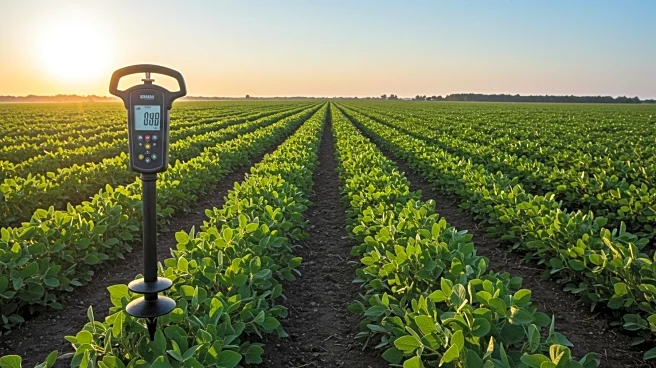What's Happening?
Steve Gauck, a regional agronomy manager for Beck's, is employing a soil penetrometer to identify and address soil compaction issues in soybean fields. This tool helps agronomists like Gauck understand belowground conditions that affect crop growth, such as root development and nodulation. Gauck's approach involves using the penetrometer to detect compaction layers that can hinder plant growth, especially in fields where vertical-tillage tools have been used. By sharing this tool with farmers, Gauck aims to educate them on the presence and impact of soil compaction, which can be exacerbated by wet conditions during planting. The penetrometer provides a practical method for farmers to assess soil health without disturbing the plants, offering insights into the depth and severity of compaction layers.
Why It's Important?
The use of a soil penetrometer is crucial for improving soybean yields and overall crop health. Soil compaction can restrict root growth and nutrient uptake, leading to reduced plant vigor and lower yields. By identifying compaction layers, farmers can adjust their tillage practices to minimize soil disturbance and improve crop performance. This tool also helps in making informed decisions about soil management, potentially reducing the need for chemical interventions. Gauck's initiative highlights the importance of understanding soil conditions to enhance agricultural productivity, which is vital for sustaining the U.S. soybean industry amid growing global competition.
What's Next?
Farmers who adopt the use of soil penetrometers may begin to see improvements in crop yields and soil health. As awareness of soil compaction issues grows, there may be increased interest in adopting no-till practices and cover cropping to prevent compaction. Additionally, agronomists and researchers might explore further innovations in soil assessment tools to provide more comprehensive data on soil health. Gauck's approach could lead to broader educational efforts to equip farmers with the knowledge and tools necessary to optimize their soil management strategies.
Beyond the Headlines
The focus on soil health and compaction issues underscores a shift towards sustainable agricultural practices. By reducing reliance on heavy tillage and chemical inputs, farmers can contribute to environmental conservation and soil preservation. This approach aligns with broader trends in agriculture that emphasize sustainability and resilience in the face of climate change and resource constraints. Gauck's work exemplifies the potential for agronomic tools to drive positive change in farming practices, fostering a more sustainable and productive agricultural sector.









